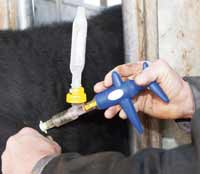Keep up BVD jabs despite bleeding calf concerns

Farmers are still urged to vaccinate for BVD despite an association between Pregsure BVD vaccine and bovine neonatal pancytopenia – bleeding calf syndrome – being investigated across Europe.
Farmers should carry on vaccinating cattle against bovine viral diarrhoea with Pfizer’s Pregsure BVD, despite the product’s voluntary withdrawal from the market in Germany.
The German action followed high incidence of bovine neonatal pancytopenia (BNP) – formerly known as bleeding calf syndrome.
The association of BNP with BVD vaccination is being investigated by research bodies across Europe, explained Pfizer’s Ed Ferguson. “While a causal relationship between Pregsure BVD and BNP has not been established, the decision has been made to stop selling the product in Germany.
“Pfizer is working with research bodies to further investigate BNP. The decision to stop sales in Germany – which has the highest incidence of BNP in Europe – is part of a wider strategy to identify the exact causes of the emerging syndrome.”
The Vet Medicines Directorate said no direct link between the use of Pregsure BVD and BNP had been proven. “But the VMD has received reports of suspected adverse reactions with symptoms typical of BNP in which Pregsure BVD was one of the vaccines used. As of 28 February 2010 the incidence of these reactions in the UK was one animal for every 24,947 doses sold. At this stage the benefits of the vaccine are considered to outweigh the risks.”
In Germany there has been one case of BNP for every 1250 doses sold, explained Dr Ferguson. “It is anticipated that the future pattern of BNP cases in Germany may yield useful epidemiological information in understanding BNP. The appearance of BNP has occurred several years after the product’s launch suggesting, in accordance with the thinking of independent experts, that other factors are likely to be involved,” he added.
Endell Vet Group’s Keith Cutler urged farmers to keep vaccinating for BVD, as the vaccination protected the early foetus from becoming Persistently Infected (PI). “Vaccination makes sure the cow is reliably immune to the virus and will protect the pregnancy at all stages, and particularly in the most vulnerable first third of pregnancy.”
However, while immunity to BVD would not disappear overnight by not vaccinating, the problem and costs would end up escalating, he explained.
“BVD is a costly disease because of the losses it causes such as abortion losses, deformed calves and its effects on the immune system, which can make animals more susceptible to other diseases on-farm.
“However, while vaccination will help curb these losses, farmers should should have a plan in place to eliminate the disease. Vaccination is simply a step on the way to elimination,” he said.
Already this year there have been 25 confirmed cases of BNP in Scotland and 15 in England and Wales, according to VLA emerging disease expert Graham David. “At the start of the year the number of cases was low and it is only in the past couple of months we have seen cases coming through, but this is related to the calving season.” Mr David also said more cases might be seen this year simply because more farmers were aware of the disease.
The disease seems to affect calves from birth up to four weeks old with symptoms including spontaneous bleeding from what appears to be intact skin, blood in faeces and, once infected, usually death. A vet should be contacted immediately if any calves show these symptoms.
